A Quote by Derek Luke
I think it's time to do clean-up for a generation. I believe this is one of the movies that hits home for all colors and all races. Everybody I talk to, black or white, suburban, rich or poor, can relate to rejection, can relate to not having a father or a mother.
Related Quotes
Everybody can relate to feeling hopeless, at some point in their life, and everybody can relate to fighting for something that's worth fighting for, and everybody can relate to a person in their life that makes them go, "I don't know why you're here right now," but then, at the end of the day, realizing you'd do anything for them.




































